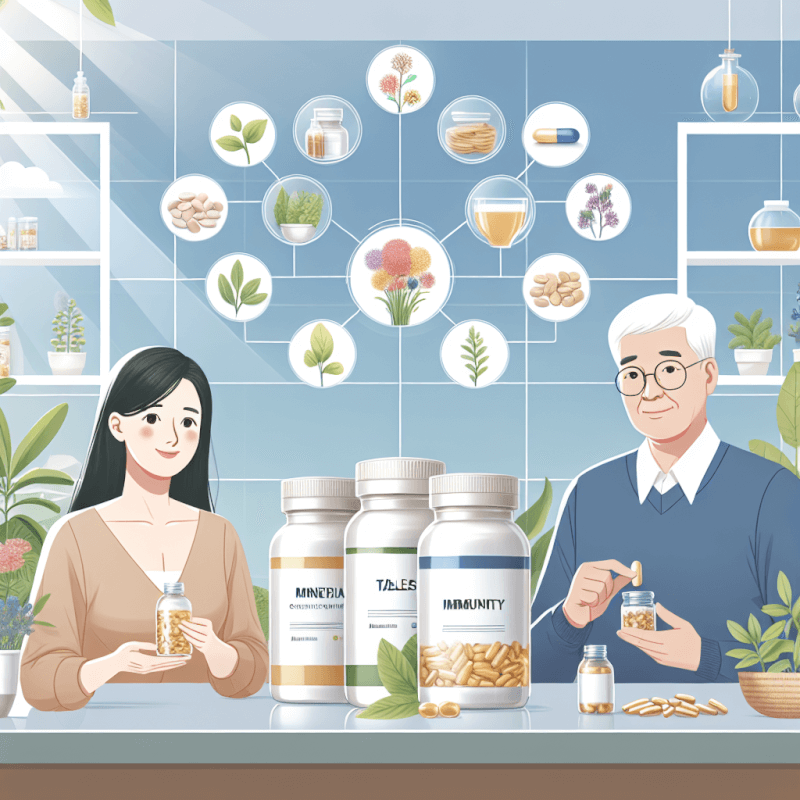As you age, it becomes vital to prioritize your immune health, and a natural way to support it is through the use of supplements. In this article, we will explore the best natural supplements that can help boost your immunity as you grow older. By incorporating these supplements into your daily routine, you can provide your body with the necessary nutrients to strengthen your immune system and guard against potential illnesses. From vitamin C and zinc to echinacea and elderberry, discover the powerful benefits of these natural supplements for a healthier and more resilient immune system in your golden years.

Vitamin C
Benefits of Vitamin C for Immune System
Vitamin C is an essential nutrient that plays a crucial role in supporting a healthy immune system, particularly in older age. As you age, your immune system may become weaker, making you more susceptible to infections and illnesses. Fortunately, vitamin C can help strengthen your immune system and keep you healthy.
One of the key benefits of vitamin C is its ability to boost the production of white blood cells, which are responsible for fighting off bacteria and viruses in your body. Vitamin C also enhances the function of these immune cells, allowing them to work more effectively. By increasing your intake of vitamin C, you can help bolster your immune system and improve your body’s ability to fight off infections.
Additionally, vitamin C is a powerful antioxidant that can help protect your immune cells from damage caused by harmful free radicals. Free radicals can weaken your immune system and leave you more vulnerable to infections. By consuming foods rich in vitamin C or taking vitamin C supplements, you can help neutralize these free radicals and maintain a strong immune system.
Best Food Sources of Vitamin C
While vitamin C supplements can be a convenient option, it’s always best to obtain nutrients from whole foods whenever possible. There are many delicious and nutritious foods that are excellent sources of vitamin C. Some of the best food sources of vitamin C include:
- Citrus fruits such as oranges, grapefruits, and lemons
- Berries like strawberries, raspberries, and blueberries
- Kiwi fruit
- Red and green bell peppers
- Broccoli
- Spinach
Incorporating these foods into your diet can provide you with a natural and wholesome source of vitamin C. Try to include a variety of these foods in your meals to ensure you’re getting an adequate amount of this vital nutrient.
Supplementing with Vitamin C
If it’s challenging for you to get enough vitamin C through your diet alone, or if you have specific health conditions that require higher doses of vitamin C, supplementation may be an option. Vitamin C supplements are widely available and come in different forms, including tablets, capsules, and powders.
When considering vitamin C supplements, it’s essential to choose a reputable brand that undergoes third-party testing to ensure quality and potency. Additionally, it’s advisable to consult with your healthcare provider before starting any new supplementation regimen, especially if you’re taking prescription medications or have any underlying health conditions.
Taking vitamin C in supplement form can be a convenient way to ensure you’re meeting your daily needs, particularly if your diet falls short. However, it’s important to remember that whole foods should always be the main source of nutrients, and supplements should be used as a complement to a healthy diet rather than a replacement.

Vitamin D
Importance of Vitamin D for Immunity
Vitamin D is another essential nutrient that plays a crucial role in supporting a healthy immune system, especially in older age. Unfortunately, deficiencies in vitamin D are common, particularly among older adults. This deficiency can negatively impact immune function and increase the risk of infections.
Vitamin D is unique because it acts as a hormone in the body, regulating various processes, including immune function. One of the primary roles of vitamin D is to stimulate the production and activity of immune cells, such as T cells and B cells, which are vital for fighting off infections. Having optimal levels of vitamin D can help enhance the function of these immune cells, leading to a stronger immune response.
In addition to its direct effects on immune function, vitamin D also plays a role in reducing chronic inflammation, which is associated with many age-related conditions. By reducing inflammation, vitamin D can help prevent the immune system from becoming overactive and initiating harmful immune responses that can damage healthy tissues.
Natural Sources of Vitamin D
The primary natural source of vitamin D is sunlight. When your skin is exposed to sunlight, it synthesizes vitamin D from cholesterol. However, many older adults may have limited sun exposure due to factors such as mobility issues or living in regions with less sunlight. In such cases, it’s important to ensure an adequate intake of vitamin D through dietary sources.
Fatty fish, such as salmon, mackerel, and sardines, are excellent sources of vitamin D. Additionally, egg yolks and fortified dairy products like milk and yogurt can also provide small amounts of this essential nutrient. If you follow a vegan or vegetarian diet, you can consider fortified plant-based milk alternatives or supplements to meet your vitamin D needs.
Supplementing with Vitamin D
Supplementation may be necessary for older adults who are unable to meet their vitamin D requirements through sunlight and dietary sources alone. Vitamin D supplements are available in various strengths and forms, such as capsules, tablets, or liquid drops. It’s important to choose a high-quality vitamin D supplement and follow the recommended dosage guidelines.
However, it’s crucial to note that vitamin D supplementation should be done under the guidance of a healthcare professional. Your healthcare provider can assess your vitamin D levels through a blood test and recommend the appropriate dosage based on your individual needs. Regular monitoring of vitamin D levels is essential to ensure optimal immune function and overall health.
Remember that while supplements can be beneficial, they should not replace a healthy lifestyle and a well-rounded diet. Aim to include natural food sources of vitamin D in your meals whenever possible and supplement only when necessary and as directed by your healthcare provider.



